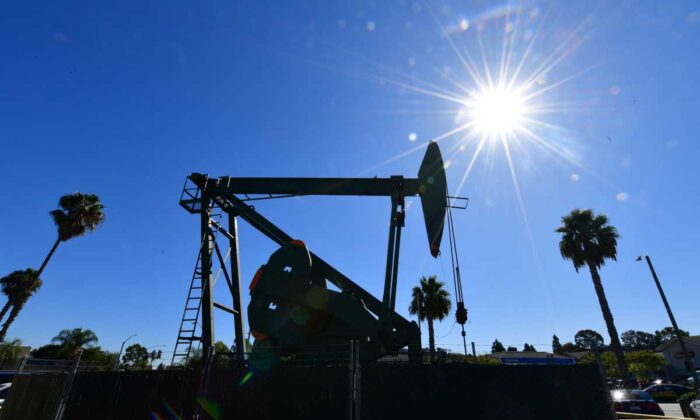Following a shock selloff in U.S. oil futures last month that saw prices dive into negative territory, oil prices climbed more than 4 percent on Wednesday on signs of improving demand and a drawdown in U.S. crude inventories.
Brent crude futures were up $1.38, or 3.98 percent, at $36.03 per barrel at 10:54 a.m. ET while U.S. West Texas Intermediate (WTI) July crude futures were up $1.38, or 4.32 percent, at $33.34 a barrel. Both benchmarks rose more than 5 percent during the session.
“The rise has been driven both by increased demand and cuts to supply,” Ross Waetzman, director of corporate recovery at Gavin/Solmonese, told The Epoch Times in an email. He said Chinese demand for oil has largely recovered following a 20 percent pullback, and U.S. consumption also saw a rebound.
The easing of lockdown restrictions worldwide is boosting demand for fuels, while initial shipping data shows that compliance with oil production cuts from the Organization of the Petroleum Exporting Countries (OPEC) and its allies has been strong so far.
“Supply has also improved with OPEC agreeing to cut supply by 9.7 million barrels with Saudi Arabia cutting a further 1 million barrels,” Waetzman said, adding that supply in the United States has dropped by 12 percent from record highs in March.
U.S. crude inventories fell by 5 million barrels in the week to May 15 to 526.5 million barrels, Energy Information Administration data showed, compared with analysts’ expectations in a Reuters poll for a 1.2 million-barrel rise.

Financial adviser William Stack said another factor pushing oil futures prices upward is explained by massive liquidity injections into markets by the Federal Reserve.
“While there has been some reduction in production, and a slight increase in demand as areas open up for business, this does not completely explain the current rally in oil,” Stack told The Epoch Times in an email.
“In the same way that the Fed has intervened in the corporate bond market, with purchases that include ETF鈥檚, they have also intervened in the futures and other markets that are used to help determine the oil price,” he added.

Still, lingering concerns about the economic fallout in the United States from the outbreak of the CCP (Chinese Communist Party) virus, the novel coronavirus that causes the COVID-19 disease, have kept a lid on oil gains.
Casting a shadow on the oil market rally is unemployment, with some 36 million people filing jobless claims in the United States since states started imposing stay-at-home orders in March.
“It is highly unlikely all these jobs will come back. What is likely is widespread bankruptcies and consolidation in several business sectors, especially travel and hospitality,” Brian Milne, analyst at DTN Marketwire, told The Epoch Times in an email.
“The market will be forced to consider these dynamics as the current uptrend in demand from recent lows is capped well below pre-pandemic levels,” he added.
Waetzman expects more downside for oil prices as supplies stored on oil tankers hit markets.
“With over 155 million barrels still stored on idle oil tankers around the globe, crude oil prices are not yet at equilibrium levels,” he said.
He said he expects virus-driven demand reduction to continue exerting downward pressure on prices for another 18 months.
“The follow-on economic impact will be far more severe and could keep oil below $40 for the foreseeable future,” he said.
Reuters contributed to this report.
Focus News: Oil Prices Surge on Firmer Demand, Reduced Supply
Sen. Menendez Asks DOJ to Investigate Former Rep. with Venezuelan Ties
